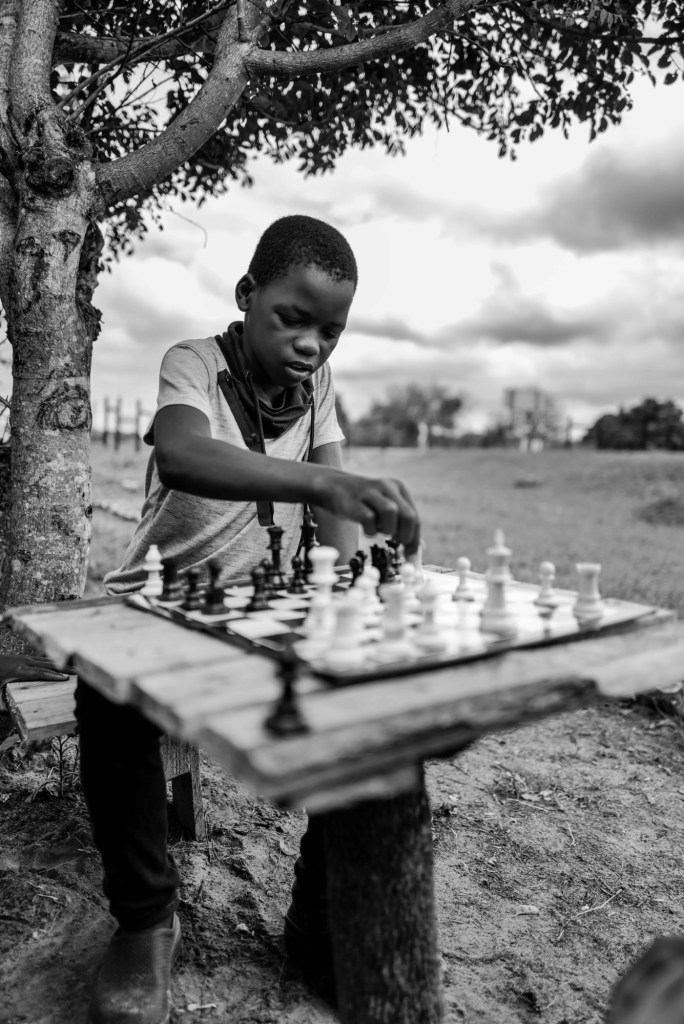I wrote about Lucky and his Hlulabantu Chess Club and posted it on my blog, and Craig Mitchell kindly published it in his Khakibush Magazine.
After the publicity, some friends passed by and left money with Lucky. Lucky asked the children what they wanted to do with it. Unanimously, they all said they should play for the money as a prize. The winners then went to the local store and bought chips for everyone. Ubuntu in action.
Another friend donated another fourteen chess sets. I delivered these and two electronic chess timers on the Easter Weekend. Lucky and his students have now built a chess garden on the other side of the R22. The chess garden is set under the shade of trees and is bounded neatly by a rim of buried upturned glass bottles. The entrance is flanked by two neatly painted tires with white writing announcing the chess garden.
There is a table that seats six with bench seats. Then there are smaller tournament tables for two players with benches. All the woodwork was done by Lucky and his students. They buy used wooden pallets and new nails from the local store.
While taking this all in, I gave Lucky a cardboard roll. He unfurled the contents, a banner showing chess pieces and the South African flag and proclaiming the “Hlulabantu Chess Club.” He beamed and the students crowded around, taking in something that was theirs. Proudly they scouted a site and then hoisted the banner and posed beneath it for the victory photograph.
Lucky and I have been talking about contextualising and translating chess for his students. Lucky went to the Hlulabantu Primary School near where he teaches chess to the children of his village. This is my edit of our conversations and his texts explaining to me why he teaches chess and how he contextualises the game for Zulu children living away from cities:
“Chess, to me, is not merely a game but a symbolic representation of strategic conflicts akin to the battles waged between nations or clans. The intricacies lie in the roles of the pieces, with a king symbolizing leadership and a queen embodying the power and grace of a matriarch. However, when attempting to impart this understanding to my fellow Zulu-speaking community members, I encountered a significant barrier—language.
The challenge extended beyond mere language differences; it pertained to a lack of relatability and context. The conventional way of teaching chess often assumes a universal understanding, but the intricacies of the game can get lost in translation. To bridge this gap, I found it essential to contextualize the game, making it more relevant to the daily experiences of those I aim to teach.
The metaphorical association of chess with a war between nations might not resonate deeply within our community, where such matters are typically entrusted to soldiers or warriors. Instead, my goal is to anchor the game in the fabric of our daily struggles, demonstrating its potential as a tool for personal growth and problem-solving.
I explain the game as a clash between two families competing for fields. The king and queen are Mkhulu and uGogo, respectively elder or grandfather and grandmother. The back line of the board are their supporting friends, including the bishops who are good and bad witch doctors (the good move diagonally on the white squares and the evil move diagonally on the black squares). Other friends include the horse that is easily understandable and the rook or castle. The Zulus still have rooms in their homes called “indumba” reserved for the ancestors, and I have called the rook after this. The pawns of the children of the family who need to obey the elders by moving only forward except diagonally when they can attack. In this way the children can understand chess in their own language and culture.”
At this visit Lucky asked me if I knew what terms his students used for “check?”
The students gathered around and pointed at an imaginary king with their fingers:
“Pasopa Mkhulu,” from the Afrikaans “pasop” for beware and the Zulu “Mkhulu” for a respected elder.
“And do you know what we say for “checkmate?”
Their little fingers motion the fall of the king and they answered:
“Lala phansi Mkhulu.” This blew me away. “Sleep peacefully, respected elder.” Lucky had single handedly removed the war imagery and lordship from chess.
“Now” Lucky said, “we are ready for a tournament!”

















